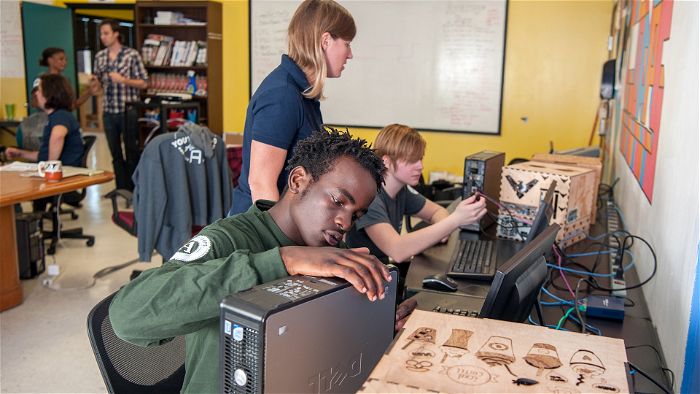While there is a comprehensive apprenticeship system for adults and a growing movement to expand access to apprenticeship for high school and college students, young people who are disconnected from the education and workforce systems or who lack the credentials and skills necessary to access postsecondary pathways are often unable to take advantage of this valuable training opportunity.
Apprenticeship programs, and work-based learning in general, can be important elements of any effort to ensure that opportunity youth—young people ages 16-24 who are underconnected with, or disconnected from, the education and workforce systems—can access meaningful career and education pathways.
As of January 2020 there were 4.9 million opportunity youth in the United States, and emerging data indicates that that number has increased drastically in the economic downturn sparked by COVID-19. Getting opportunity youth involved in apprenticeships can go a long way toward ensuring that they will not be left behind. Moreover, with employer demand for highly skilled workers on the rise as older workers retire and the number of new technologies grows, providing opportunity youth with the training they need to learn in-demand skills will fill a critical gap in the labor market.
Career Connections
Apprenticeship provides an effective and supportive learning environment that includes hands-on training, classroom learning, and real-world connections to employers. That combination can help opportunity youth develop both the technical skills and the employability skills they need to enter into and advance within a range of industries.
For some opportunity youth, pre-apprenticeship programs can be especially valuable because they provide wraparound services and supports in addition to work-based learning activities. The work-based learning component of pre-apprenticeships can help opportunity youth explore career and education pathways within an industry, and help them connect the skills and competencies they acquire to occupations and full apprenticeship opportunities that align with their long-term goals. Work-based learning experiences also help them increase their social capital by building professional networks through which they can make connections to additional job and apprenticeship opportunities.
A Supportive Approach
Some youth who are not in school and not employed may need preparation and support to succeed in the first stage of the apprenticeship continuum. This is particularly important for Registered Apprenticeships, because entrance qualifications and standards are high and typically require a high school diploma as well as high basic skills.
In addition, the journey from pre-apprenticeship through apprenticeship is long and requires persistence. Young adults—in particular, those who are not in school or employed—can have personal needs that can interfere with retention and completion, such as child care, transportation, stable housing, emotional safety, and physical well-being. Providing access to wrap-around supports, such as living stipends, childcare, or housing, transit, and food subsidies can remove very real barriers and help opportunity youth to meet and balance training requirements with the complex and challenging demands they may face outside the program.
When delivering a pre-apprenticeship, apprenticeship, or work-based learning activity to opportunity youth, it is also important to structure the delivery of training and classroom learning in a way that meets each learner where they are so that they can access and digest information and demonstrate what they are learning in the ways that make the most sense for their unique learning styles. This can increase their skills gains and strengthen their understanding of how what they are learning transfers to different occupations across learning.






